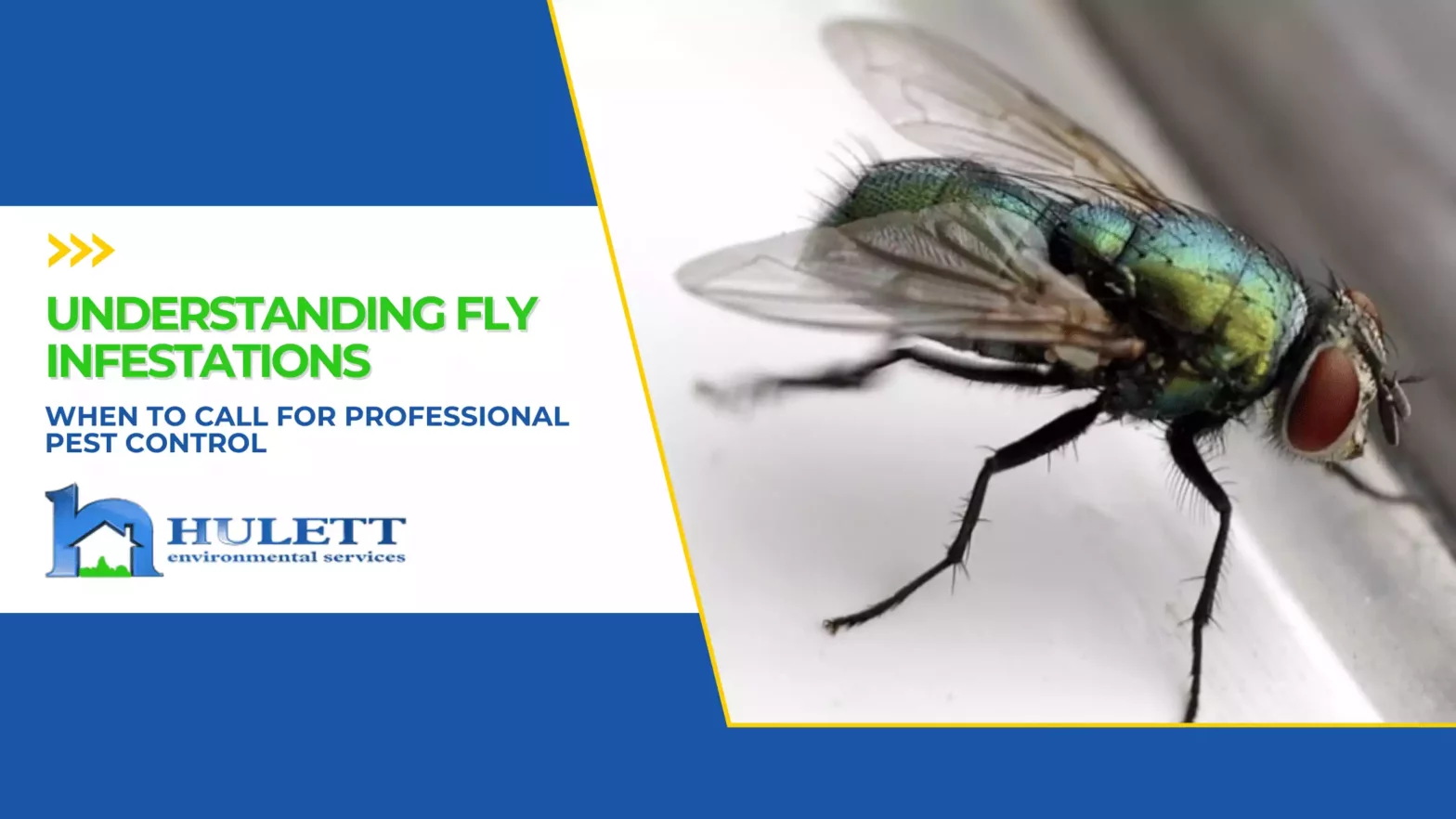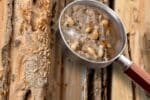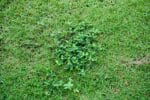
Understanding Fly Infestations: When To Call for Professional Pest Control
Whether they’re buzzing through your barbecue, harassing you as they dart around your head, or contaminating food in open containers, flies are an unwelcome sight in any home. But how did they get inside? Where do the flies keep coming from? And how do you stop the infestation from spreading? This often depends on the type of fly, as each tends to infest different areas around your home or yard, making any DIY attempt very challenging. Exterminating fly infestations typically requires a professional. But don’t worry, Hulett is here to help, so let’s find out together in this comprehensive guide to the different kinds of flies and fly control in Florida.
What Makes Florida a Fly Paradise?
Florida’s climate is the key to the prevalence of fly infestations. Our state’s warm, humid conditions provide the perfect environment for flies to breed and multiply, with temperatures rarely dipping below 60 degrees Fahrenheit. The warm weather we love allows these pests to remain active all year, resulting in multiple reproduction cycles and rapid infestations.
Compounding these ideal conditions, the frequent rainfall and abundance of standing water create ample breeding sites for flies, especially in the summer months when their populations tend to peak. This results in an environment well-suited for flies year-round, making them an ever-present problem in South Florida homes.
Types of Flies in Florida: What You Need To Know
Not all flies pose the same level of danger, but each has its own set of risks.
First and foremost, flies reproduce at an alarming rate. They lay their eggs in places where food and moisture are abundant, such as trash cans and garbage disposals, and rarely accessed corners of the home like the garage. These breeding sites can be challenging to locate, and in just a few days, larvae can develop into reproductive adult flies. This rapid life cycle means an infestation can grow exponentially if left unchecked for even short periods.
Another critical risk for consideration is the speed at which flies spread germs. You may not bat an eye when a fly lands on your hamburger bun, but the truth is that flies can contaminate surfaces and food within seconds. Unlike humans, flies lack teeth and regurgitate a small amount of acidic fluid to digest and break down food before siphoning it into their sponging mouths. This process, termed a “vomit drop”, can introduce harmful bacteria and viruses to your food.
We know it’s an unsettling thought, but imagine that happening every time a fly lands on your food. Needless to say, all flies spread germs at a remarkable rate that can result in illness or disease.
Identifying Common Biting Flies in Florida: What To Look For

Biting Midges—Ceratopogonidae
Commonly found in Florida, biting midges, also known as no-see-ums or gnats, are small but mighty when it comes to the discomfort they can cause. Similar to mosquitoes, Biting midges feed on blood, and their bites can result in mild to severe skin reactions, including redness, itching, and, in some cases, allergic reactions. These tiny insects have an outsized presence in Florida yards and are known for swarming in large numbers and quickly ruining outdoor activities.
Deer Flies—Chrysopsinae
Deer flies are prevalent in Florida’s swamps and woodlands, but it is not uncommon to see them in residential areas, particularly during the warmest parts of the day. These large flies are aggressive and notorious for their painful bites caused by their scissor-like mouthparts. While non-venomous, like all flies, their bites can cause redness and swelling.
Horse Flies—Tabanidae
Horse flies are another aggressive species that thrive in Florida’s humid, lake-filled environments. Loud, mean, and known for their painful bites that cause significant redness and swelling, horse flies are most active during the early morning and late evening hours. Their bites are painful and can lead to secondary infections if not treated properly.
Stable Flies—Stomoxys calcitrans
Stable flies thrive in South Florida, especially around beaches and cattle. These small insects exhibit persistent biting behavior, which can be challenging and painful to manage. While their bites do not typically cause swelling, they can be irritating, unrelenting, and may transmit diseases. Stable flies are especially problematic in areas where livestock is present, but given how common they are in the region, don’t be surprised if you find one in your home.
Where Do Flies Come From? Understanding Common Breeding Sites
Flies are opportunistic breeders, taking advantage of natural and artificial environments. In nature, flies often breed in decaying organic matter, stagnant water, and animal waste. However, many homes provide even more ideal conditions for fly reproduction. For example, a neglected trash can, damp vegetation and soil in plant beds, clogged gutters or drainage lines in the kitchen, or even a leaky pipe can become a perfect breeding ground for flies.
Indoors, flies can find numerous places to lay their eggs. Kitchen sinks, garbage disposals, and under appliances where moisture accumulates can be ideal breeding sites. Because these locations are often out of sight and difficult to reach, fly infestations can quickly develop without the homeowner’s knowledge. In some cases, the indoor environment can be even more conducive to fly reproduction than the outdoors, making it crucial to your home’s health to maintain cleanliness and routine pest control maintenance by a professional pest control company near you.
Recognizing the Signs of a Fly Infestation
Fly infestations can escalate quickly, so keep an eye out for these early signs of infestation:
- Increased fly activity. If you notice a sudden uptick in the number of flies around your home, particularly near food or trash, it could be a sign of an infestation.
- Larvae or maggots. The presence of larvae or maggots in trash cans, sinks, or other damp areas clearly indicates an ongoing fly infestation.
- Unusual odors. A strong, unpleasant odor near breeding sites may suggest decaying organic matter, which attracts flies. Keep in mind that this odor could be from rodent carcasses, which can attract blow flies, green bottle flies, and flesh flies.
Tips for Maintaining a Fly-Free Environment

Fly prevention can be difficult because all it takes is two reproductive adults to springboard an entire infestation. To help mitigate the risk of flies in your home, we recommend you:
- Seal entry points. Properly seal all windows, doors, and vents, whereas pest control companies can place a fly trap nearby to prevent flies from entering your home.
- Practice proper waste management. Dispose of garbage regularly, ensuring the trash cans and bags are tightly sealed to avoid attracting house flies.
- Maintain cleanliness. Regularly clean kitchen counters, sinks, and other areas where food particles might accumulate. Remember to clean under appliances and hard-to-reach corners to prevent fruit flies, humpback flies, scuttle flies, and phorid flies.
- Remove standing water. Address any leaky pipes or areas of standing water, as these can serve as breeding grounds for flies, especially fungus gnat and drain flies. Routine pest control can help prevent flies from laying eggs in your plumbing.
Just Call Hulett For South Florida Pest Control!!
With dozens of South Florida fly species trying to invade your home, these persistent insects will always outnumber you. But with Hulett at your side with the latest eco-friendly treatments, you can put the odds back in your favor. Hulett is the local pest control expert that can properly identify the fly, diagnose the problem, make recommendations to remove the conducive conditions, and perform the proper treatment.
Count on our over 50 years of success in South Florida pest control to help protect your family and pets from flies and other pests with our healthy home guarantee. For a free initial inspection and expert support from our pest specialists today, Just Call Hulett!



